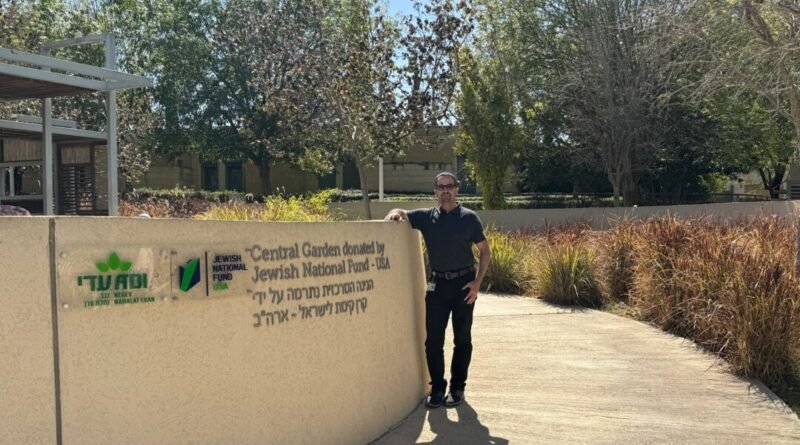Israeli Center for Disabled Children Adapts to Change on Oct. 7
ADI Negev’s rehabilitation services serve wounded soldiers as well as developmentally delayed children and adults.
OFAKIM, Israel—The only rehab center in southern Israel faced a new reality on Oct. 7, 2023, as did the entire country.
Focused on the care of the severely handicapped, it faced sudden demand for its two regular rehab wings.
Soldiers wounded that day and in the subsequent war often came from Israel’s southern-based battalions and lived in the area. They might have been rushed to hospitals up north for trauma care and surgery. But they wanted their rehab closer to home.
ADI Negev-Nahalat Eran stepped up what it could offer them.
Soldier rehab, said the center’s development director Elie Klein, proceeds with a certain goal because that’s what the soldiers want: helping them regain the use of arms and legs so they can rejoin their units and fight. Of about 30 soldiers there, at least two are close to that.
The center goes the extra mile for those paying a high price to defend the country. The cafe stays open 24 hours so they can meet their family members there at any time, and eat for free.
The center, at the war’s outset, suddenly became barracks space to hundreds of soldiers guarding it and a strategic crossroads close by. The soldiers found Inpatient Care Director Dr. Shiloh Kramer personally guaranteeing they’d get whatever they needed.
He scrounged combat boots, flak jackets and Jewish religious items like tefillin for reservists who had mustered in a hurry. He’s done the same for soldiers in rehab. They know they can go to him directly, not an underling, when they need something.
They pay him a unique compliment, Mr. Klein said. They don’t use his title: “They just call him ‘Kramer,’ like he’s one of them.”
ADI Negev opened the first rehab hospital in southern Israel, the Kaylie Medical Rehabilitation Center, in June 2022, Mr. Klein said. One 36-bed unit houses orthopedic rehabilitation, with another 36-bed unit for neurological rehab. A third unit for high dependency and geriatric patients will open this fall.
ADI Negev’s primary business remains caring for severely handicapped children and adults. Its worldwide reputation stems from building a community for its clients rather than warehousing them.
It survived Oct. 7 almost unscathed. A few miles from the Gaza frontier, it is sandwiched between communities savaged that day, including the town of Ofakim, where 50 residents were murdered by Hamas terrorists.
ADI Negev didn’t go completely untouched. One night shift worker was murdered as she drove home. But a bus filled with center employees missed the terrorists by two minutes. They arrived safely.
As fires smoldered in kibbutzes and villages nearby, as emergency workers pulled bodies from the rubble, numerous staff and client families agonized over their dead or missing. The fates of some would remain undetermined for weeks.

Israel’s new crisis: The war has so far left around 20,000 Israelis wounded, 2,000 disabled for life, and 500 amputees, Mr. Klein said.
While known for world-class medical care and plenty of doctors, Israel suffered a chronic rehab shortage. On Oct. 8, 2023, that problem became acute.
The center juggled its routine significantly. Most disabled clients lived for weeks in sheltered areas without leaving them, because they can’t be moved quickly when an air-raid siren sounds, Mr. Klein said.
Rehab wings designed for 72 beds now hold 83. The center’s old hospital came out of mothballs and will reopen soon to add another 28 rehab beds.
Just One Bad Day
“Disability is something where, it takes just one bad day and you’re going to be living with disability for life,” Mr. Klein said.
The center had added rehab wings because those temporarily disabled by stroke, heart attack, auto accident, or IDF training mishaps could benefit from the same facilities designed for the severely handicapped: therapeutic swimming pools, specially adapted horseback riding, or working with therapists to relearn how to feed and dress themselves.
A futuristic anti-gravity treadmill employs technology used to train astronauts for weightlessness. The lower body of a soldier who can’t walk is sealed airtight. Controls allow most of the soldier’s weight to be removed. Lighter now, he begins to walk on the treadmill. As he improves over time, the weight he bears gradually increases.
The therapists, Mr. Klein said, “run them like soldiers. Many of the soldiers said, ‘We don’t just want rehabilitation. We want to make sure that we have the rehabilitation that is going to get us back into the field. We want to go back and keep fighting.’”
The center fills a critical gap. Until it opened its two new rehab wings, Israel had only 850 rehabilitation beds for its 9.7 million people, far too few, Mr. Klein said. Not a single bed was in Israel’s south—where the attack took place and where many of the soldiers wounded, live. Mostly the Negev Desert, the south contains 60 percent of Israel’s land area but only 13 percent of its population.
Residents needing rehab had to leave the area, going to big urban centers hours north. That separated them from family at a time when they really needed them. Or they’d stay in urban hospitals where they had received acute care, continuing family separation.

A Hero of Entebbe
Founded by an IDF general and his wife to provide better care for their autistic son and those like him, the center on a 40-acre site houses 170 clients with multiple disabilities, and provides day services for 190 more who live with their families.
It offers state-of-the-art therapies. It reaches out to surrounding communities to help their clients in various ways. Clients who get college-level agricultural training, farm and garden on the lush 40-acre site. They’re the ones maintaining its lovely landscaping.
It houses a preschool and kindergarten mixing disabled with mainstream tots who live nearby, to the benefit of both. The clients get to mix with regular kids and the latter learn to treat them as brethren. That school has a waiting list. The center plans to expand to eight such classes.
Recently given another 150 acres by a local government which once opposed it, ADI Negev plans a blended development featuring fully accessible homes where disabled clients can live next door to mainstream folks.
“We don’t say ‘can’t’ or ‘won’t,’” Mr. Klein said. “We look at them as a dare.”
The center exudes an idealism: no child should be written off. That’s from its founder, reserve Maj. Gen. Doron Almog.
The soldier distinguished himself in some of Israel’s most dramatic incidents—the rescue of terrorist hostages at Uganda’s Entebbe Airport in 1976; the payback dealt out to terrorists who murdered 11 Israeli athletes at the 1972 Munich Olympics; and the clandestine airlift extracting 7,000 Jews from Ethiopia in 1984.
A paratroop commander at Entebbe, he was the first to land on the runway and the last to leave—symbolic both, Mr. Klein said, of leading from the front and of making sure no one was left behind. The ADI Negev center embodies that.
It’s personal for Mr. Almog.
As young soldiers, he and his brother Eran fought in the 1973 Yom Kippur War.
A half century before Oct. 7, Israel also suffered a surprise attack on a holiday: invasion by Egypt and Syria. Israel held them off but at the cost of 5,000 soldiers’ lives in three weeks.
Doron Almog returned from that war. His brother did not. Eran Almog’s body was found a week later by his destroyed tank in the Golan’s Valley of Tears. There, heavily outnumbered Israeli tanks were overrun by Syrian tanks in the war’s opening hours.
“He was left bleeding and dying next to a burning tank for seven days,” Mr. Klein said. His brother took to heart that terrible and undignified death.
Mr. Almog and his wife Didi named their second child for Eran. When the boy was 2 months old, doctors told them he would never progress beyond the level of a toddler. Eran had multiple disabilities, autism and a rare disease, Castleman’s, which would later kill him.
The couple looked for years for the right program for him, an “extended family” to do what they could not, Mr. Klein said.
They found nothing good. Such children were “locked away,” Mr. Klein said, seen as embarrassments for their families.
The Almogs disagreed.
“They believed they needed to be brought out of darkness into light, to build communities around them, actual villages, to draw out their abilities,” Mr. Klein said. Such places could also serve those needing rehabilitation for temporary disabilities.
“He couldn’t find such a place, so he built it,” Mr. Klein said.
 Source link
Source link
- Barbara Samuells tells Newsmax that Louisiana Commandments Law is ‘Extremely Stable’
- Source: Biden to ban sales of Kaspersky software in the US due to connections to Russia, reports OANN






